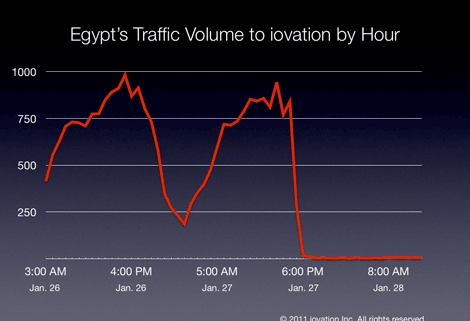Front Row Seats When Internet Doomsday Hits Egypt
Most of us would have no idea Egypt had pulled the plug on the Internet unless it was splashed all over the news. However one company called iovation knew right away.
Basically “just like that” the up to 1000 fraud checks they receive every hour out of Egypt dropped to zero. At first glance one would think there was some type of meltdown or maybe Egyptian scammers all of a sudden decided to get a job.
Normally, iovation would see thousands of queries from Egyptian customers interacting with businesses of all types, including social networks, online dating sites, online gaming sites, banks and retailers. Then at about 6:00 pm Eastern time, nothing.
“We’ve got a unique view of the Internet at iovation. Our service experiences the interaction of unique computers and mobile devices from every nation on earth, across a broad swath of Internet commerce,” says VP of Corporate Development, Jon Karl. “When we’re seeing Egypt’s Internet fall off a cliff, it’s at a more precise individual user level rather than just through aggregated online traffic. While transactions from Egypt represent a very small percentage of the queries to iovation’s service, it has a ripple effect that’s felt by a wide variety of our customers.”
NPR reports “Egypt has apparently done what many technologists thought was unthinkable for any country with a major Internet economy: It unplugged itself entirely from the Internet to try and silence dissent. Experts say it’s unlikely that what’s happened in Egypt could happen in the United States because the U.S. has numerous Internet providers and ways of connecting to the Internet. Coordinating a simultaneous shutdown would be a massive undertaking.”
And while experts say it is unlikely in the U.S., a bill is in fact being proposed to unplug the Internet. “Legislation granting the president internet-killing powers is to be re-introduced soon to a Senate committee, the proposal’s chief sponsor told Wired.com.” Scary stuff.
iovation, is headquartered in Portland, Oregon, and has pioneered the use of device reputation to stop online fraud and abuse. The software-as-a service used by online businesses assesses risk of Internet transactions all over the world and recognizes if a device such as a PC, tablet or smartphone has a history of fraudulent behavior. This helps organizations make educated decisions if they want to do business with the person using the device.
Robert Siciliano, personal security and identity theft expert contributor to iovation, discusses the possibility of an internet crash on Fox Boston. Disclosures



























